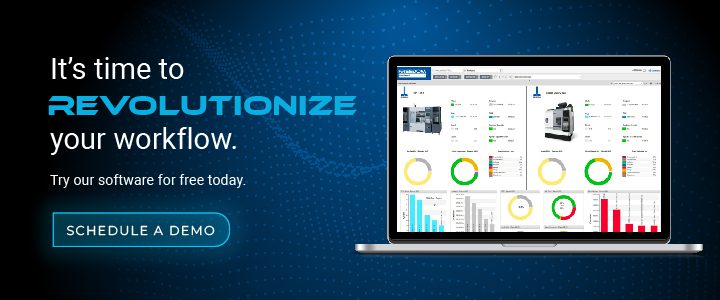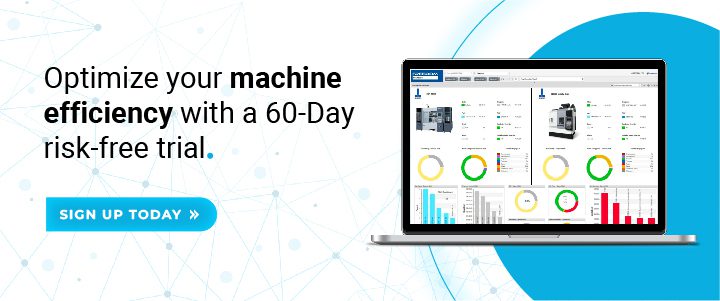OEE Software for Leading Modern Manufacturers
Our pioneering OEE software transforms data into actionable insights, optimized assets, inventory, and predictive maintenance for unprecedented business value – Unlock Operational Excellence with Freedom® IOT
Take control of your manufacturing operation today. Discover Freedom® IOT.
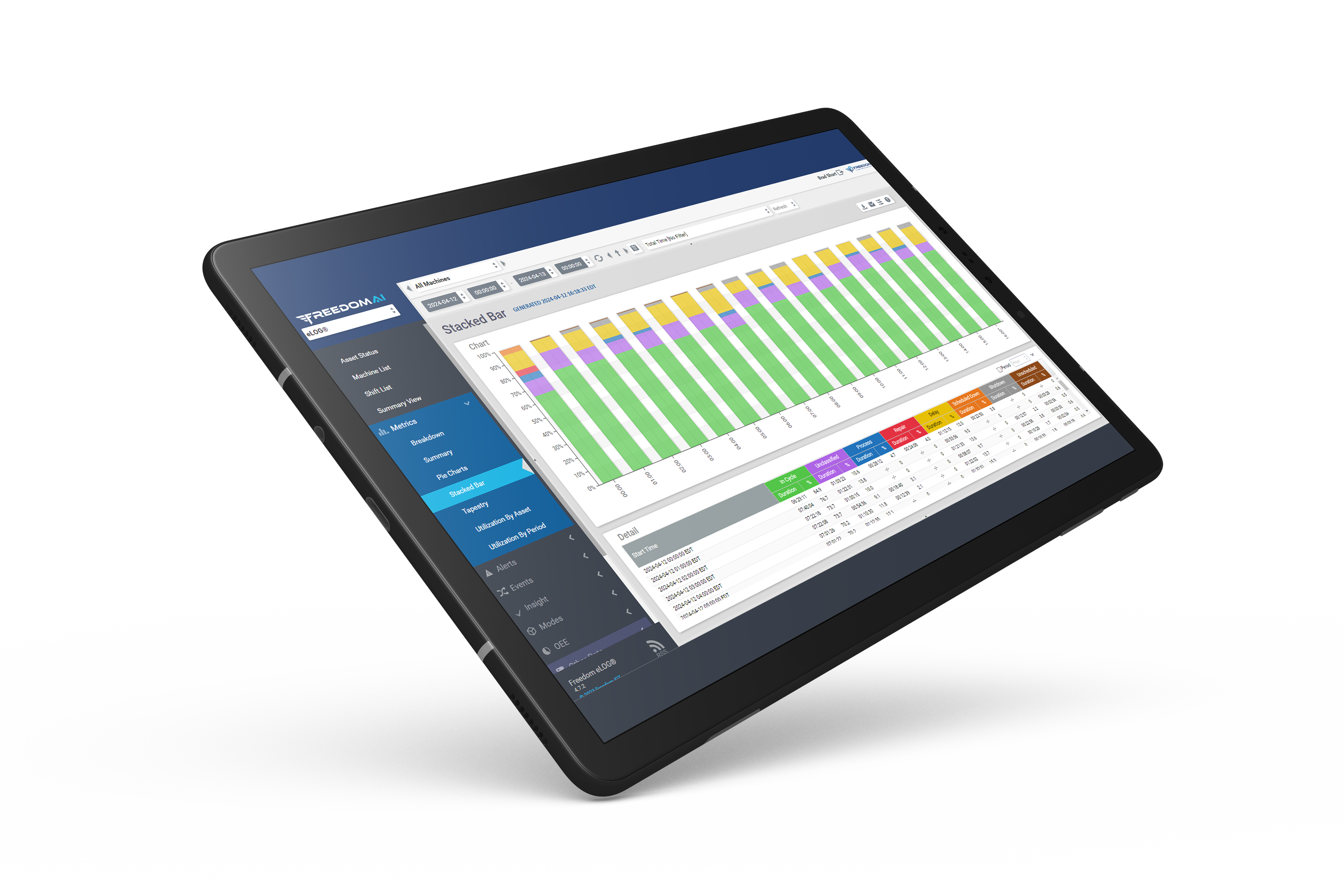
Trusted by leading manufacturers:






What is OEE Software?
The basics of oee
Overall Equipment Effectiveness (OEE) software is a powerful tool that empowers manufacturers to track, analyze, and optimize the efficiency of their production processes.
The software gauges the performance of manufacturing equipment by monitoring three core components:
Availability
Performance
Quality
OEE software offers an in-depth understanding of where production losses are occurring and provides actionable insights to improve these metrics.
For manufacturers, OEE software is not just a tool, but a catalyst for enhancing operational efficiency.
OEE Software helps:
Identify bottlenecks
Minimize downtime
Maximize productivity
By providing real-time data and trend analyses, OEE software aids in strategic decision-making, fosters continual process improvements and thus, overall business growth. Its importance in improving efficiency cannot be overstated, as it fundamentally transforms how manufacturers manage their operations and achieve their productivity goals.
Who OEE Software is For
many different roles can use & benefit from oee
Manufacturing Companies
Leveraging OEE software, manufacturers across all sizes and sectors can achieve exceptional production efficiency and streamlined operations, maximizing their return on investment.
Plant Managers
Plant managers can use OEE software to monitor plant-wide operations, reduce waste, enhance efficiency, and ensure the facility meets its production targets.
Supply Chain Managers
Supply chain managers can use the data from OEE software to forecast production capabilities accurately, optimize inventory levels, and improve overall supply chain efficiency.
Quality Control Analysts
Quality control analysts can utilize OEE software to perpetually scrutinize the production processes, identifying quality discrepancies and ensuring a waste-reduced manufacturing environment.
C-Level Executives
OEE software provides them with critical data and insights about the overall efficiency and effectiveness of the manufacturing processes, which can inform strategic decisions.
Benefits of OEE Software
the many benefits of oee
Real-Time Tracking
OEE software pinpoints production slowdowns or stoppages in real-time, enabling immediate corrective actions and reducing downtime.
Data-Driven Decision-Making
OEE software empowers managers to make decisions based on hard evidence, optimizing resource utilization and operational efficiency.
Improvements in Quality Control
OEE software facilitates early detection of quality issues, minimizing waste, rework, and associated costs.
Predictive Maintenance
OEE software tracks equipment performance trends, predicting potential machine failures and supporting proactive maintenance efforts.
Continuous Improvement
OEE software provides a reliable baseline for tracking the progress of improvement efforts, validating the effectiveness of implemented changes in manufacturing operations.
OEE Software Main Features
what you get from our software
Real-Time Tracking Dashboard
Select from an extensive array of dashboards to generate dynamic and impactful real-time metrics. Keep your whole organization up-to-date by showcasing these metrics on shop floor monitors, mobile devices, and personal computers.
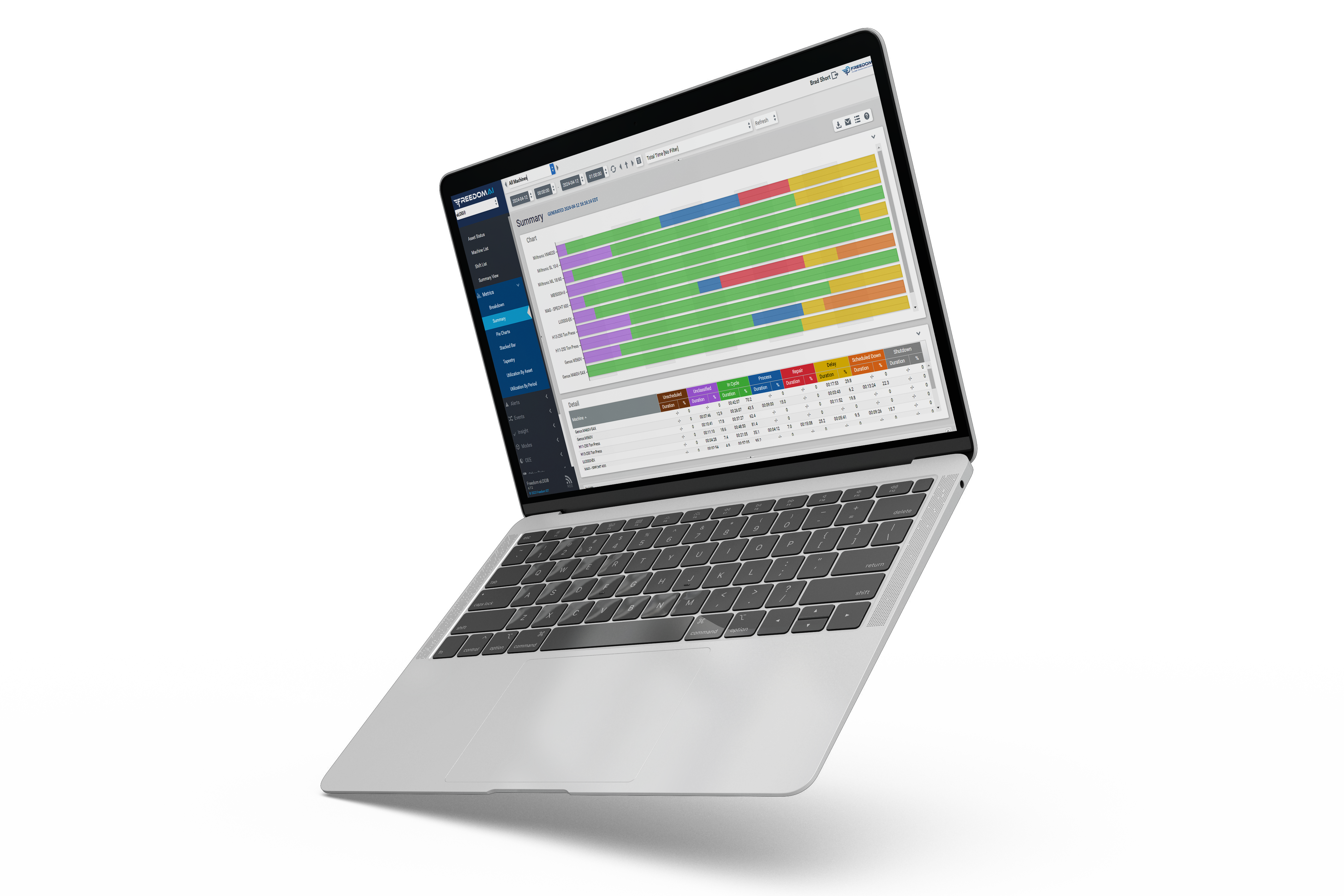
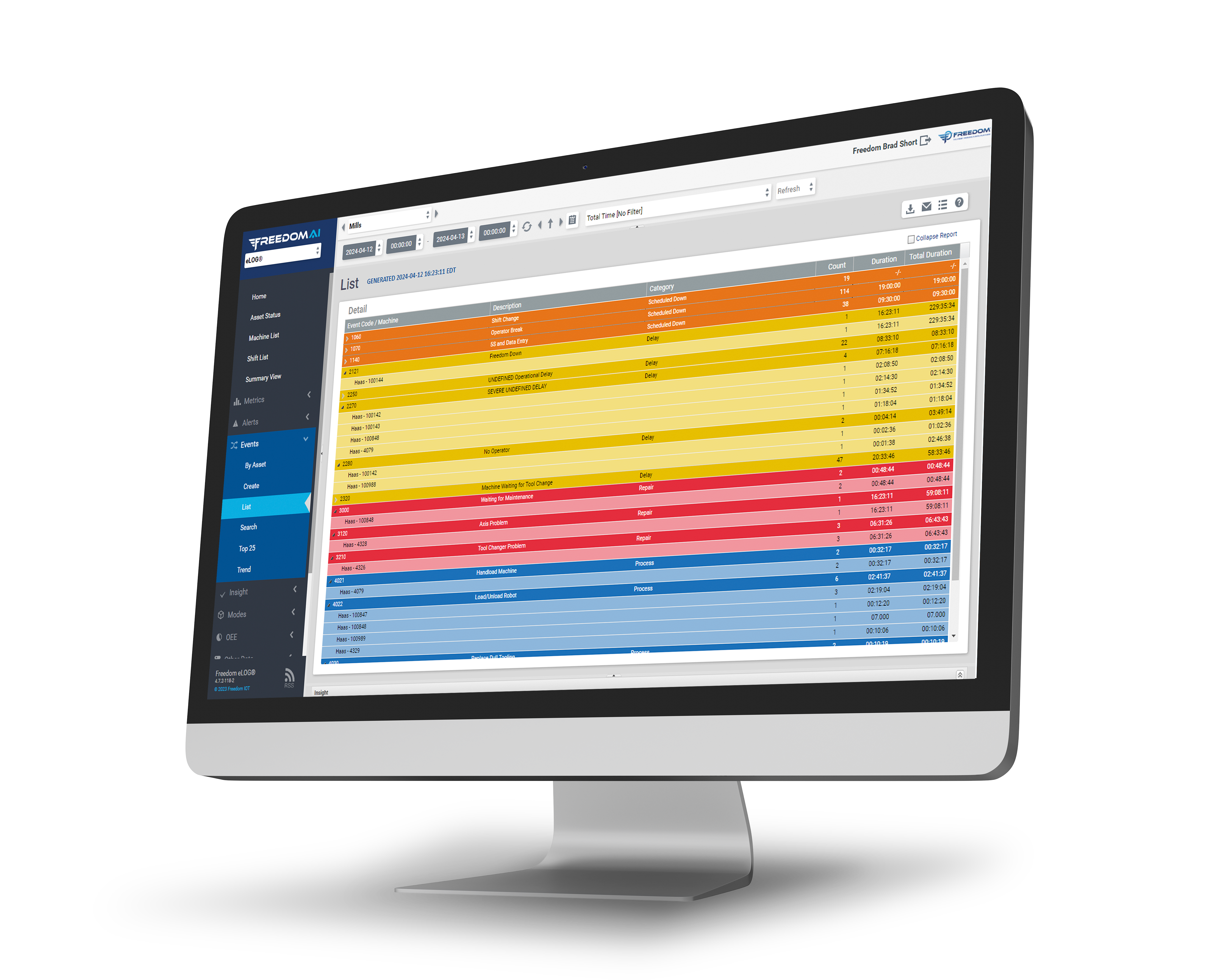
Downtime Analysis
Track and analyze equipment downtime, helping to identify root causes and implement strategies to reduce unproductive time and increase efficiency.
Reporting and Analytics
Create personalized reports specific to your role or area of responsibility. Choose from Freedom AI’s standard reports, Real-Time Dashboards, or use the Report Builder’s enhanced dashboard capability to build professional looking metrics.
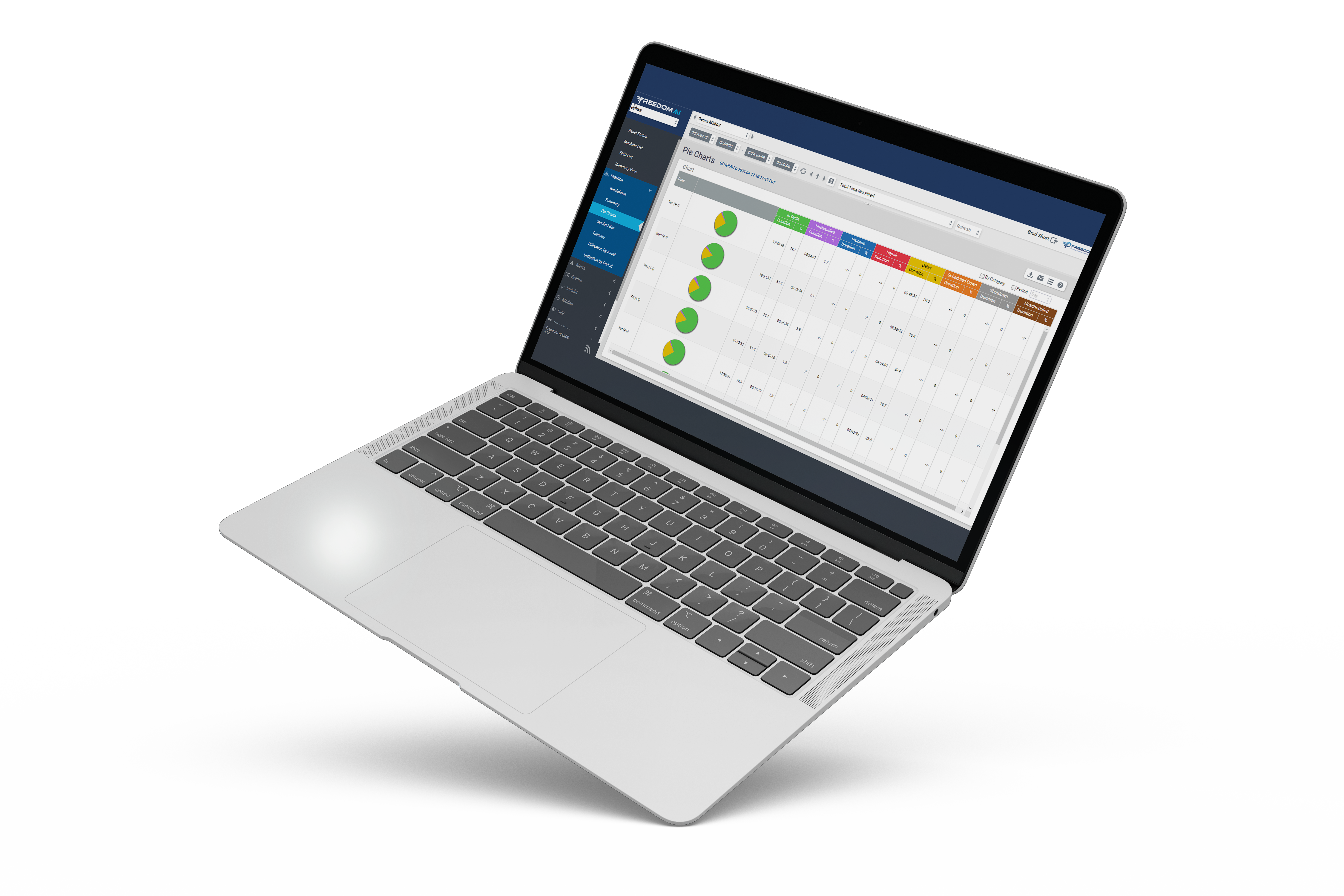

Predictive Maintenance
Predict potential machine failures based on equipment performance trends, and reducing unexpected downtime.
User-Friendly Interface
Enable operators to seamlessly engage with Freedom AI to categorize downtime events, input part production data, and interact with any Real-Time Dashboard created within the platform.
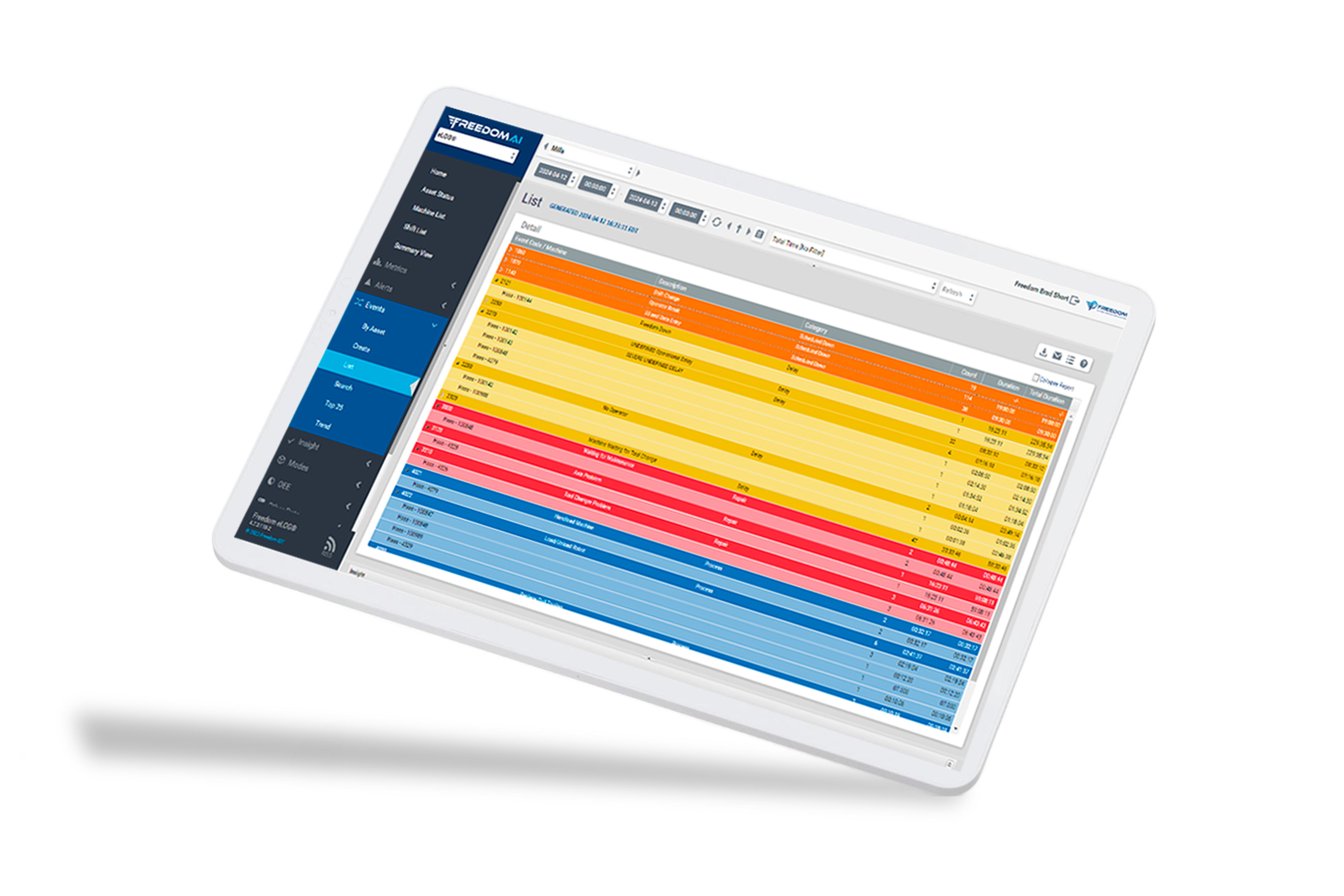

Alerts and Notifications
Get scheduled reports delivered directly to your inbox and receive instant push notifications on your mobile devices regarding various production activities and machine performance metrics.
Get Real-time Precision Data
Click the button below to start your 90-day free trial of Freedom IOT software and revolutionize your machine workflow.
Client Testimonials
What our CUSTOMERS are saying, and case studies prove.
Three Pillars of OEE
Availability, Performance, Quality
The three pillars of Overall Equipment Effectiveness (OEE) – Availability, Performance, and Quality, provide a comprehensive measure of manufacturing productivity and efficiency.
Availability
The first pillar, Availability, measures the percentage of scheduled time that the operation is producing parts. It takes into account events that stop planned production for an appreciable length of time, usually several minutes. Such events typically include equipment failures and unplanned maintenance, among others. Increasing availability means minimizing downtime, and for manufacturers, time truly is money.
Performance
The second pillar, Performance, assesses the speed at which the work center runs as a percentage of its designed speed. It accounts for losses in speed due to reasons other than availability, often categorized as engineering issues impacting cycle time such as tooling and reduced speeds. In essence, it quantifies any factors that cause the manufacturing process to operate below its maximum possible speed.
Quality
The third pillar, Quality, measures the good units produced as a percentage of the total units started. It takes into account manufactured products that do not meet quality standards, including those that need rework. A higher quality rate indicates a lower proportion of defective parts in the production process, reflecting the level of waste generated in manufacturing. Together, these three pillars offer a robust tool for assessing the effectiveness and efficiency of a manufacturing process. They provide actionable insights that can help identify areas of improvement and drive strategies to improve manufacturing efficiency and productivity
How OEE Software increases your ROI
Freedom's OEE Software
Achieving a strong return on investment (ROI) with Overall Equipment Effectiveness (OEE) software hinges on the software’s ability to drive improvements in production efficiency and productivity. By providing detailed insights into manufacturing operations, OEE software can help identify inefficiencies, reduce waste, and increase output – all factors that directly impact a company’s bottom line.
Minimize Downtime
Firstly, by minimizing downtime, OEE software can significantly reduce costs associated with equipment failures and unplanned maintenance. The software's predictive maintenance capabilities can foresee potential equipment issues, allowing for preventative measures that not only increase the lifespan of the machinery but also prevent costly repairs and stoppages.
Improve Quality
Secondly, OEE software can help enhance production speed and quality. By monitoring performance, the software can identify production bottlenecks and slowdowns. This, in turn, enables the implementation of strategies to optimize production speed, thereby increasing output. Similarly, by tracking quality, the software can help detect issues early, reducing the costs associated with rework and waste.
Inform Decision Making
Thirdly, OEE software supports data-driven decision-making. With the wealth of data provided, companies can make more informed strategic decisions, whether that's investing in new equipment, adjusting production schedules, or implementing new processes.
Tips on Achieving OEE Success
1. Start with Accurate Data
For successful OEE implementation, it’s critical to ensure the data you’re working with is accurate. Carefully calibrate your machinery and train your staff to record and report data correctly.
2. Continuous Monitoring
Regularly monitor your OEE trends. Continuous monitoring helps identify any fluctuations or anomalies that may indicate underlying issues requiring attention.
3. Use Real-Time Data
Real-time data allows for immediate action when issues arise. The quicker you respond to an issue, the less impact it will have on your overall efficiency.
4. Understand the Component
Remember that OEE is comprised of three components: availability, performance, and quality. Understanding what each one represents and how they interact can help you identify where to focus improvement efforts.
5. Set Realistic Target
While it’s great to aim high, unrealistic targets can demotivate a team. Use industry standards, historical data, and the capabilities of your machinery to set achievable goals.
6. Focus on Continuous Improvement
Rather than striving for a perfect OEE score, focus on continuous improvement. Small, incremental changes can lead to significant improvements over time.
7. Get Everyone Involved
From operators on the shop floor to top management, everyone should understand the importance of OEE and their role in improving it. The more people involved in the process, the greater the likelihood of success.
8. Utilize OEE Software
Utilize the power of OEE software to automate data collection and analysis, track trends, and generate reports. This not only saves time but also provides more accurate and actionable insights.
9. Incorporate Predictive Maintenance
Use OEE data to perform predictive maintenance. This can help prevent unexpected machine failures and reduce downtime.
10. Act on Insights
Data is only as good as the actions it informs. Once you’ve identified areas for improvement, develop a plan to address these issues and track the effectiveness of your strategies over time.
Get Started with Freedom
Take the first step in optimizing your machine shop with Freedom IOT today.
